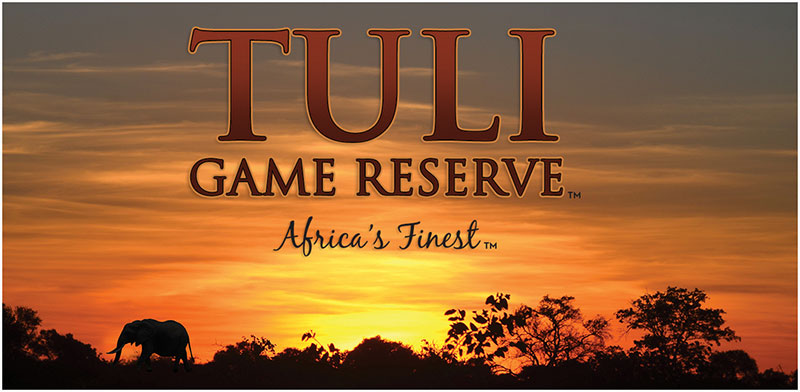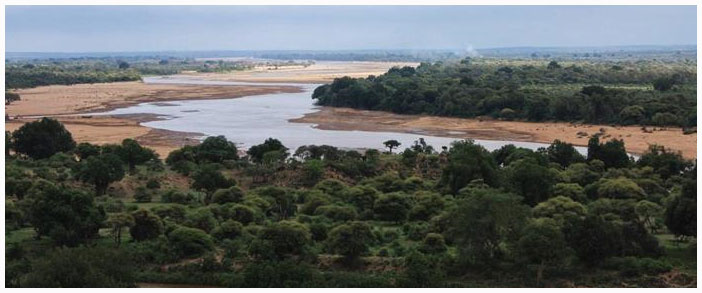
PRESENTS: THE TRANS FRONTIER CONSERVATION AREA
Looking for something special to show your guests?
Visit Trans Frontier Conservation Area where the mighty Shashe and Limpopo Rivers meet!
About 270km2 of the proposed land for the trans frontier conservation area lies within South Africa, with Mapungubwe National Park forming the core. Also included on the South African side are the Venetia Limpopo Nature Reserve (established by De Beers mining company) and the proposed Limpopo Valley Game Reserve, where farms are discussing joint management of land.
In Botswana, 36 farms covering 70,000ha form the Northern Tuli Game Reserve, a livestock-free zone dedicated to game ranching and commercial photographic safaris. The game reserve has five upmarket lodges and a number of tented safari camps. In Zimbabwe, less of the proposed land is currently used for conservation, although the Tuli Circle Safari Area (41,100 ha) and two large commercial farms (Sentinel Ranch and Nottingham Estates together 47,000ha) have abundant wildlife.

The History of Limpopo/ Shashe Trans Frontier Conservation Area ("TFCA")
David de Waal - full name David Christiaan de Waal - was a well-known personality in Cape Town society and politics in the late 19th century; by 1877 he was elected to the Cape Town City Council, and served a term as Mayor of the City from 1879 to 1880. It was in July of 1880 that Cecil John Rhodes was appointed Premier of The Cape Colony. Since both David de Waal and Rhodes were by then members of the Cape Parliament, they became acquaintances and friends. When Rhodes decided to visit Bechuanaland and Matabeleland later that year, he invited David to accompany him. At about this time Rhodes had formed the Chartered Company, also registered as The British South African Company, to handle the sole mineral concessions he had obtained from King Khama of Bechuanaland and King Lobengula of Matabeleland. As today the U.S. has set up a military presence in many of the world´s oilfields, so Rhodes established British military camps, notably on the Motloutse River and at Fort Tuli, to "safeguard" his mineral concessions.
Thus it happened that David de Waal and Rhodes met with King Khama at a place by the name of Malalola, and then accompanied him to his place of residence at Palapye. From there the Rhodes party´s trek must have crossed what is today part of Notugre, from the Motloutse to Fort Tuli, where they arrived on the 1st of November 1890. David de Waal could not have guessed that one of his granddaughters, Margaret de Waal-Davies, would marry a certain Willem Coetzer (William Bedford Coetzer), and that Willem would also travel to the Land of Tuli and peg out a piece of land for himself and his family in its most beautiful eastern corner, at the confluence of the Shashe and Limpopo rivers (Margaret and Willem had met when they both worked in the old Provincial Administration Building on Whale Street in Cape Town). Not long after Willem and his family´s move from the Cape to Johannesburg in the early 1940´s, Willem met Kaalkop van der Merwe, an attorney and farmer from Heilbron and a business associate. Kaalkop introduced Willem to the Northern Tuli Block where in the mid 40´s Willem acquired a farm adjacent to Kaalkop´s farm "Safari" bordering on the Tuli Circle. It was at this time that Willem heard of, and became interested in, that wild and abandoned peace of bush at the confluence of the two great rivers, the Shashe and the Limpopo, The Charter Reserve.
It was a veritable no-man´s land, and the islands at the "toon" (Afrikaans for toe - so called after the shape of this terminal eastern part of what was then still the Bechuanaland Protectorate) were rumoured to be the refuge of many a poacher since it was believed to be neither part of Bechuanaland, South Africa, or the then Southern Rhodesia. Willem Coetzer, Kaalkop van der Merwe and Marius Jooste (a Free State teacher who had moved into the Johannesburg Afrikaans newspaper business) put their heads together and with the assistance of Maruis Jooste´s elder brother Gerhard, who was then South African High Commissioner in London, secured a long term lease of the approximate 16 000 morgen constituting the whole of the Charter Reserve, from the Bechuanaland Protectorate, and the British South Africa Company (circa 1950).
In the early 1960´s the three lessees were given the opportunity to buy the Charter Reserve; the threesome formed the Charter Company (Pty) Ltd. and the purchase was made. Soon after a number of friends and business associates were invited as shareholders, the Reserve was divided in six portions, and individual title distributed to six owners. So it came about that Willem Coetzer received Deed of Transfer of Portion 3 of the farm Charter Reserve in August of 1965. By good fortune this was that most eastern portion of the Charter Reserve bordered by the confluence of the Shashe and Limpopo rivers. Willem Coetzer passed onwards in September of 1989. His last will and testament left his farm, which had by that time been named "Shalimpo", to his family trust which he had created in 1984, so that today The WB Coetzer Trust is the registered owner of Shalimpo. Through the years, from circa 1950, Willem and Margaret Coetzer´s children and grandchildren have had the privilege to enjoy many wonderful and magical times on the farm, and many memories of many happenings and experiences, and some hard work as well, too numerous to record here.

In the 1940´s the then South African Prime Minister, Jan Smuts, wanted to create a game reserve at the confluence of the Shashe and Limpopo rivers, to be known as the Dongola Game Reserve. The plan was to establish an international game reserve consisting of land on both sides of the Limpopo and Shashe rivers at their confluence, up to and including the Tuli Circle. The scheme was eventually abandoned but has since been reactivated as one of a number of trans frontier game reserves which have been proposed in Southern Africa. When these plans are concluded, the Pitsani Game Reserve will be at the heart of the Limpopo/Shashe TFCA.
The proposed TFCA will include the Botswana Northern Tuli Game Reserve; the Mapungubwe National Park, as well as various privately owned properties in South Africa, and the Tuli circle Safari Area, Sentinel Ranch, Nottingham Estate, the Maramani Communal Land as well as a number of other Resettlement Areas in Zimbabwe. The inclusion of the various areas is under negotiation.
On 21 June 2006 Notugre, as representatives of the landowners within the Northern Tuli Game Reserve, and the Botswana government signed a Memorandum of Understanding setting out the guidelines for the participation of the Botswana Government and Notugre in the Limpopo Shashe TFCA. On Thursday 22 June 2006, Ministers representing Botswana, South Africa and Zimbabwe respectively, signed an agreement to set in train the negotiations which it is anticipated should lead to the formal establishment of the Trans frontier Park.
BOOK YOUR TRIP TO THE TFCA ISLAND NOW!
CONTACT US: 086 111 TULI (8854)
RATE: Only R250 per person (The visit also includes a 4 hour game drive)
Please email us on reservation@tuligamereserve.com for more information.

